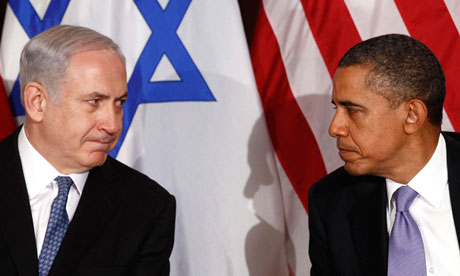
Under Barack Obama and Benjamin Netanyahu, the relationship between the allies has suffered. The United Nations resolution against Israel’s construction of settlements was quasi Obama’s “farewell greeting” to the Israeli prime minister.
Israel’s prime minister was only able hide his anger with difficulty, and he openly made clear whom he suspected was the author of all ills: departing President Barack Obama. “We have no doubt that the Obama administration initiated it, stood behind it, coordinated on the wording and demanded that it be passed,” Netanyahu said on Sunday. Netanyahu criticized Obama for breaking with the good U.S. tradition of not “trying to dictate terms for a permanent agreement.” Israel had been victim of a ”shameful anti-Israel ambush at the U.N.” by the USA.
The resolution in which the U.N. Security Council demanded a stop to all Israeli settlement activities on the West Bank and East Jerusalem deeply rocked Israel’s government because it was the first time since 1979 that the highest body of the United Nations condemned Israel’s settlement policies. Up to now, a U.S. veto always hindered such resolutions. Yet, this time, everything was different: The U.S. just withheld its vote.
This measure might well be Obama’s—diplomatically harsh—farewell greeting to Netanyahu. To be sure, both men lead two allied countries, yet, over the past few years, Obama and Netanyahu were not even associated with one another on friendly terms.
For example, at the last minute, Netanyahu rejected an invitation by the U.S. president and let the media inform him.
A year earlier, Netanyahu traveled to Washington to speak before the U.S. Congress. The appearance was, as it were, organized behind Obama’s back by then speaker of the House of Representatives John Boehner. And at that time, the U.S. president gave the Israeli head of state the cold shoulder. He did not receive Netanyahu because he allegedly did not want to interfere with Israel’s elections. In truth, it was a matter a more tangible matter: Israel’s prime minister came to Washington to openly convey in Congress an atmosphere against Obama’s nuclear treaty with Iran, and the U.S. president viewed that as a diplomatic affront.
Controversy about the Nuclear Treaty with Iran
The international nuclear treaty with Tehran driven by the Obama administration is one of the main reasons behind the bad relationship between the White House and Jerusalem. For Israel’s government, the treaty was a red flag from the beginning. Netanyahu’s criticism is that the treaty grants Tehran the basic right to nuclear power, which would be a threat for Israel. Netanyahu at all times rejected the argumentation of the U.S. government, according to which only this treaty could prevent a military nuclear armament. He is for a tougher course of action with respect to Iran. Yet, with the nuclear treaty and the lifting of sanctions held in prospect, the Iranian regime is internationally acceptable again, which makes the Israeli leadership angry.
Through the nuclear treaty with Tehran, the outgoing U.S. president achieved an important foreign policy goal. However, he was unable to implement another intention, the advancement of an Israeli-Palestinian peace settlement. The Obama administration saw Netanyahu’s settlement policies as an obstacle to this. Obama and his secretary of state, John Kerry, were always adamant that only a two-state solution, or the establishment of a Palestinian state next to Israel, could lead to peace. In the election campaign, Netanyahu had again and again sounded that there would be no Palestinian state during his term in office as head of state. Obama had already threatened in June that Israel’s government could no longer be sure of the unqualified support of the U.S. in the United Nations.
Donald Trump Offers Criticism
Even if the U.S. has not dealt a veto in favor of Israel for the first time in a long while, and Netanyahu is furious about it, it will of course not change anything about the basic alliance between Washington and Jerusalem. The future U.S. president, Donald Trump, has already harshly criticized the conduct of his predecessor’s administration in the U.N. Security Council anyway.

Leave a Reply
You must be logged in to post a comment.